Understanding Numbers 7:26
Verse: Numbers 7:26 - "One golden spoon of ten shekels, full of incense." This verse is part of the larger context of the offerings presented by the leaders of Israel during the dedication of the altar. Each leader brought an offering, which is recorded meticulously in this chapter.
Meaning and Interpretation
The essence of Numbers 7:26 lies in the significance of offerings and the dedication to God. As explained by noted commentators, this scripture emphasizes the importance of what is given to God, representing both material wealth and spiritual devotion.
Insights from Matthew Henry
According to Matthew Henry, the “golden spoon” and “incense” symbolize the sweetness of worship. The spoon, made of valuable metal, indicates that our offerings to God should reflect the value we place on our relationship with Him. Incense is often used in the Bible as a metaphor for prayer, suggesting that our prayers should be as pleasing to God as fragrant incense.
Insights from Albert Barnes
Albert Barnes adds that the specific mention of the weight (ten shekels) highlights not only the value of the offering but also the uniformity and orderliness in the services of worship. This denotes that God is a God of order, and our worship should be performed according to divine instruction, reflecting His holiness.
Insights from Adam Clarke
Adam Clarke emphasizes that the act of bringing offerings, as demonstrated by the leaders, was essential in showing commitment and leadership within the community. He points out that this was not merely a ritual but an expression of gratitude and acknowledgment of God’s provision and presence.
Thematic Connections
This verse establishes thematic connections with several key concepts throughout Scripture. As we explore the cross-references, we can discern a pattern of dedication, offerings, and worship established throughout the Bible.
Bible Cross References
- Exodus 30:34-38 - Discusses the preparation of sacred incense, which ties to the purpose of the offerings in Numbers.
- Leviticus 2:1-2 - Describes the grain offering, highlighting the idea of bringing one's best to God.
- Psalms 141:2 - "Let my prayer be set before You as incense," reinforcing the connection between incense and prayer.
- Hebrews 13:15-16 - Speaks of the sacrifices of praise and good works, linking the concept of offerings in the Old Testament to New Testament worship.
- Philippians 4:18 - Paul's mention of gifts being a fragrant offering aligns with the idea of sacred offerings.
- Revelation 5:8 - The golden bowls full of incense representing the prayers of the saints brings together the motif of worship across scripture.
- 1 Peter 2:5 - The idea of being a "holy priesthood" who offers spiritual sacrifices connects with Israel’s role as God's chosen people.
Comparative Analysis
This verse additionally engages in a thematic dialogue within the Scriptures, reflecting on the comparative nature of worship and offerings. The leaders' actions serve as a precursor to the New Testament principles of generosity and worship through Christ.
Connections Between Bible Verses
The connection between Numbers 7:26 and other scriptures highlights the importance of intentionality in worship and the way offerings demonstrate our love for God. Each scriptural link not only reinforces the principal theme of worship but also illustrates the evolution of that theme from the Old Testament sacrificial system to the New Testament understanding of offerings—both physical and spiritual.
Tools for Cross-Referencing
For those interested in identifying connections between Bible verses, tools such as a Bible concordance or a comprehensive Bible cross-reference guide can be invaluable. These resources can help locate scripture that relates to themes of worship, sacrifice, and prayer, enhancing one's understanding and study of the Bible.
Conclusion
In conclusion, Numbers 7:26 reflects important biblical themes of worship, sacrifice, and prayer. By exploring cross-references and thematic connections, we gain a deeper appreciation for the significance of offerings, understanding that they symbolize not only material gifts but also spiritual devotion and relationship with God.


